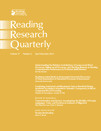
READING RESEARCH QUARTERLY
Scope & Guideline
Unveiling the science of reading for all.
Introduction
Aims and Scopes
- Interdisciplinary Literacy Research:
The journal encompasses a wide range of literacy research, including cognitive, sociocultural, and educational perspectives, addressing how literacy practices are influenced by various factors such as culture, identity, and technology. - Focus on Diverse Populations:
A significant emphasis is placed on literacy in diverse populations, including bilingual learners, LGBTQ+ youth, and marginalized communities, highlighting their unique experiences and challenges in literacy acquisition and development. - Integration of Technology in Literacy:
Research exploring the role of technology in literacy practices, including digital literacy, the impact of AI, and the use of multimodal texts, is a core area, reflecting the evolving nature of reading and writing in contemporary society. - Critical Pedagogy and Social Justice:
The journal promotes critical pedagogical approaches that advocate for social justice in literacy education, examining how literacy can empower individuals and communities to challenge inequities. - Innovative Methodologies:
A commitment to employing diverse and innovative research methodologies, including qualitative, quantitative, and mixed-methods approaches, allows for a comprehensive understanding of literacy practices.
Trending and Emerging
- AI and Literacy:
A growing body of research examines the implications of artificial intelligence on literacy practices, exploring both the benefits and challenges of integrating AI into reading and writing instruction. - Critical Race and Gender Perspectives:
There is an increasing focus on critical race theory and gender studies in literacy research, examining how these frameworks can inform more equitable and inclusive literacy practices. - Digital and Multimodal Literacies:
Emerging themes around digital literacy and multimodal literacies are gaining traction, reflecting the importance of understanding how diverse forms of media and communication influence literacy development. - Family and Community Engagement:
Research is increasingly highlighting the role of family and community in supporting literacy development, particularly in diverse and bilingual contexts, emphasizing the importance of cultural and social factors. - Trauma-Informed Literacy Practices:
There is a rising interest in trauma-informed approaches to literacy, focusing on how educators can support students' emotional and psychological needs within literacy instruction.
Declining or Waning
- Traditional Literacy Instruction Methods:
There is a noticeable decrease in research centered on conventional literacy instruction methods, as the focus shifts towards more progressive, inclusive, and technology-driven practices. - Monolingual Literacy Perspectives:
Research that solely emphasizes monolingual literacy practices is waning, replaced by a broader focus on bilingualism, translingualism, and the experiences of multilingual learners. - Standardized Assessment Practices:
The journal has seen less emphasis on standardized assessments as a primary focus, likely due to growing criticism of such measures and a shift towards understanding literacy development through more holistic and formative approaches. - Narrow Definitions of Literacy:
There is a decline in papers that adhere to traditional, narrow definitions of literacy, as the journal increasingly embraces broader conceptualizations that include digital, multimodal, and critical literacies.
Similar Journals
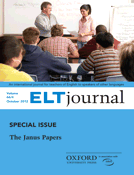
ELT Journal
Exploring Innovations in English Language TeachingELT Journal, published by Oxford University Press, is a premier academic journal dedicated to the fields of Educational Psychology, Linguistics, and Language, boasting an esteemed Q1 category ranking across these disciplines. Since its inception in 1946, the journal has served as a vital platform for researchers and educators, offering insights into English Language Teaching (ELT) and the evolving pedagogical practices that influence language acquisition and literacy development. With an impressive Scopus ranking placing it in the 95th percentile within the Arts and Humanities (Linguistics and Language), ELT Journal not only contributes to academic discourse but also bridges theoretical frameworks with practical applications in educational settings. Although it does not currently offer Open Access, the journal remains essential for professionals and students alike, eager to stay abreast of the latest research trends and innovations in the global ELT landscape. For those committed to advancing their understanding of language education, the journal's diverse range of articles and case studies provide invaluable resources.
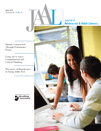
JOURNAL OF ADOLESCENT & ADULT LITERACY
Enhancing Understanding of Literacy PracticesJOURNAL OF ADOLESCENT & ADULT LITERACY is a prestigious publication dedicated to the exploration and enhancement of literacy education for adolescents and adults. Published by Wiley, this journal holds an important position in the educational research landscape, marked by its Q2 ranking in Education for 2023, reflecting its commitment to high-quality scholarship. With an ISSN of 1081-3004 and an E-ISSN of 1936-2706, this journal serves as an essential resource for educators, researchers, and policy-makers in understanding literacy development, instructional practices, and the sociocultural factors influencing literacy. Covering a comprehensive timeline from 1995 to 2024, the journal is well-known for its rigorous peer-reviewed articles, providing insights into innovative practices and empirical research that support literacy advancement. Located in the United States, with its headquarters at 111 RIVER ST, HOBOKEN 07030-5774, NJ, the journal does not offer open access but remains an invaluable asset for stakeholders in the realm of education, encouraging discourse and collaboration to foster literacy in diverse and dynamic contexts.
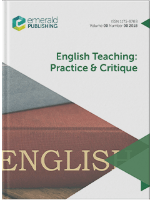
English Teaching-Practice and Critique
Bridging Theory and Practice in English Language TeachingEnglish Teaching-Practice and Critique is an esteemed journal published by Emerald Group Publishing Ltd, focusing on the interdisciplinary fields of Education and Linguistics. With a commitment to advancing knowledge and practice in English language teaching, the journal offers a platform for innovative research, critical reflections, and practical insights that are vital for educators, researchers, and students alike. The journal has established itself in the academic community, achieving a Q3 ranking in Education and a prestigious Q1 ranking in Linguistics and Language as of 2023, highlighting its impact and relevance. Although not an open-access journal, its curated content remains accessible to a global audience, facilitating meaningful discourse and development in English language education. The journal spans articles from 2008 to 2014 and 2016 to 2024, making it a valuable resource for ongoing scholarly dialogue and pedagogical advancement. It is particularly recognized within Scopus rankings, standing at the 76th percentile in Arts and Humanities as well as the 74th percentile in Social Sciences, underscoring its significance and standing in these domains.
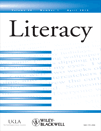
Literacy
Advancing the Dialogue on Literacy EducationLiteracy is a premier academic journal published by Wiley, focusing on critical advancements and research in the fields of education and linguistics. With an impressive impact factor reflected in its Q2 ranking in Education and Q1 in Linguistics and Language, this journal serves as a vital platform for researchers, educators, and students seeking to explore contemporary issues surrounding literacy in diverse contexts. Since its inception in 2005, Literacy has made significant contributions to understanding the evolving nature of literacy practices, promoting dialogue on innovative pedagogies and the sociocultural implications of language use. While it is not an Open Access journal, its accessibility through institutional subscriptions ensures that its valuable insights reach a broad audience. With its robust Scopus rankings, including an 88th percentile in Language and Linguistics and 63rd in Education, Literacy remains an indispensable resource for those committed to advancing literacy education and research.

Australian Journal of Language and Literacy
Empowering educators through innovative language insights.The Australian Journal of Language and Literacy, published by SpringerNature, is an esteemed platform for advancing research in the fields of linguistics, language, and education. With an ISSN of 1038-1562 and an E-ISSN of 1839-4728, this journal has been a crucial resource since its inception in 1997, now converging into its 2024 volume. It proudly holds a significant position within the Q2 category in Linguistics and Language and a Q3 classification in Education for 2023, reflecting its commitment to high-quality scholarly content. With impressive Scopus rankings in arts and humanities and education, it engages a diverse audience of researchers, educators, and linguists. Although this journal is not open access, it remains an essential resource for those seeking to enhance their understanding of language acquisition, literacy development, and pedagogical approaches. By contributing to the discourse in these vital areas, the Australian Journal of Language and Literacy plays a pivotal role in shaping the educational landscape in Australia and beyond.

Reading in a Foreign Language
Connecting Educators and Researchers in Language StudiesReading in a Foreign Language is a premier academic journal published by the University of Hawaii, College of Languages, Linguistics & Literature, dedicated to fostering the field of second language acquisition. With an ISSN of 1539-0578, this esteemed journal boasts a solid reputation, being ranked in the Q1 quartile in both Education and Linguistics, highlighting its significant impact within these disciplines. Covering the latest research and advancements from 2019 to 2024, Reading in a Foreign Language serves as an essential resource for educators, researchers, and students aiming to deepen their understanding of reading proficiency in second languages. Although Open Access is not offered, the journal's influential position is underscored by its impressive Scopus rankings, with 82nd percentile status in Linguistics and Language, and 52nd percentile in Education, making it a valuable asset for those enhancing their academic and professional pursuits in language studies.
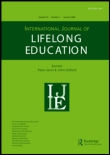
International Journal of Lifelong Education
Advancing Knowledge for Every Stage of LifeThe International Journal of Lifelong Education, published by Routledge Journals, Taylor & Francis Ltd, is a leading peer-reviewed journal dedicated to the dynamic field of lifelong learning. With an impressive convergence of research spanning from 1982 to 2024, the journal focuses on vital themes in education, e-learning, and life-course studies, and boasts a commendable Q2 ranking within its categories for 2023. It serves as an essential platform for researchers, educators, and professionals to explore and share innovative ideas and practices that address the complexities of lifelong learning in today's rapidly changing educational landscape. Although it does not currently offer Open Access, the journal provides robust access options through various academic databases, ensuring a wide audience reach. With its significant impact within the field, exemplified by its Scopus ranks—528th in Education and 30th in Life-span Studies—this journal is indispensable for those seeking to contribute to and stay informed about the latest advancements in lifelong education.
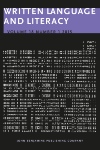
Written Language and Literacy
Bridging Theory and Practice in Written Language ResearchWritten Language and Literacy is a leading academic journal that has been at the forefront of language and literacy research since its inception in 1998. Published by John Benjamins Publishing Co in the Netherlands, this journal provides a platform for innovative and rigorous studies exploring the intersections of language, literacy, and cognitive processes. With an impressive impact factor and classified in the Q2 category for Linguistics and Language, it offers valuable insights and methodologies that contribute significantly to the field. The journal ranks 498th out of 1088 in Arts and Humanities and 577th out of 1167 in Social Sciences, placing it firmly within the academic conversation on language studies. Though it does not offer open access, it remains highly sought after by researchers, professionals, and students, ensuring a rich collection of knowledge essential for advancing literacy and language practices in diverse contexts.

READING AND WRITING
Advancing Understanding of Reading and Writing DynamicsREADING AND WRITING is a premier academic journal dedicated to exploring the interdisciplinary fields of education, linguistics, neuropsychology, and speech and hearing. Published by Springer, this journal has established itself as a leading platform for high-quality research, reflected in its impressive Q1 ranking across various disciplines in the 2023 journal quartiles. Covering significant advancements from its inception in 1989 through to 2024, READING AND WRITING emphasizes the critical interplay between reading and writing skills and their cognitive, linguistic, and educational implications. With its broad scope and commitment to advancing knowledge, this journal is invaluable for researchers, educators, and students aiming to deepen their understanding of literacy development and its impact on learning and communication. Although it operates without an open access model, the journal's rigorous peer-review process assures that published articles meet the highest academic standards, making it a reliable source of novel insights in these interconnected fields.
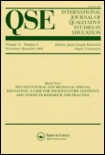
International Journal of Qualitative Studies in Education
Shaping the Future of Education Through Qualitative Insights.Welcome to the International Journal of Qualitative Studies in Education, a prestigious publication in the field of education, managed by Routledge Journals, Taylor & Francis Ltd. With a strong emphasis on qualitative methodologies, this journal serves as a critical platform for researchers, educators, and practitioners, providing insightful analyses and innovative approaches to educational inquiry since its inception in 1988. Recognized within the Q2 category in Education as of 2023, it holds an impressive Scopus rank of 570 out of 1543, reflecting its significant impact and relevance in social sciences and education research. Although it does not offer open access, the journal's rich content contributes to the advancement of qualitative research, encouraging discourse that shapes contemporary educational practices. With a commitment to rigorous scholarly standards, the International Journal of Qualitative Studies in Education aims to stimulate critical dialogue and foster community among researchers, professionals, and students seeking to deepen their understanding of qualitative research and its applications in the rapidly evolving educational landscape.